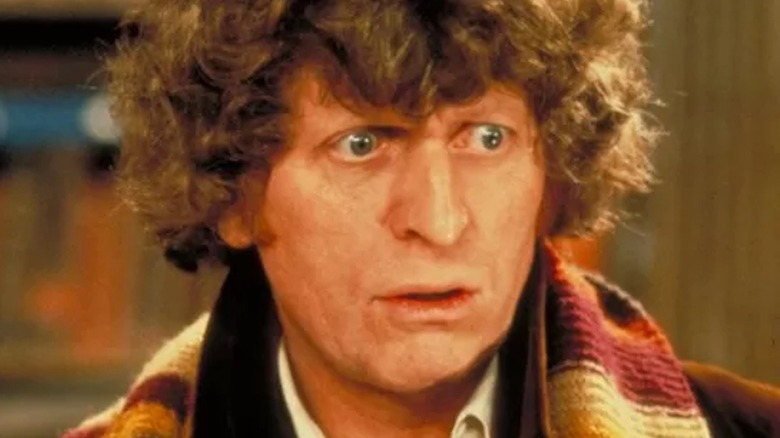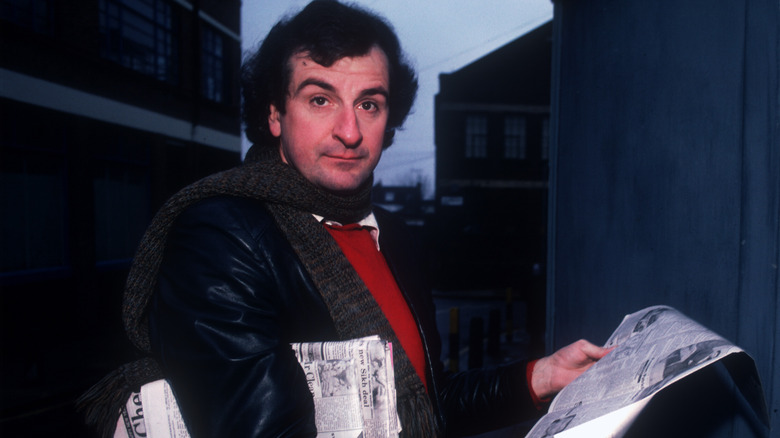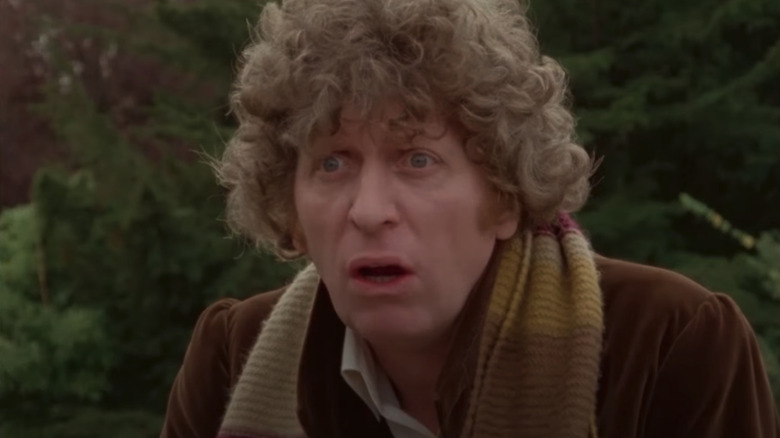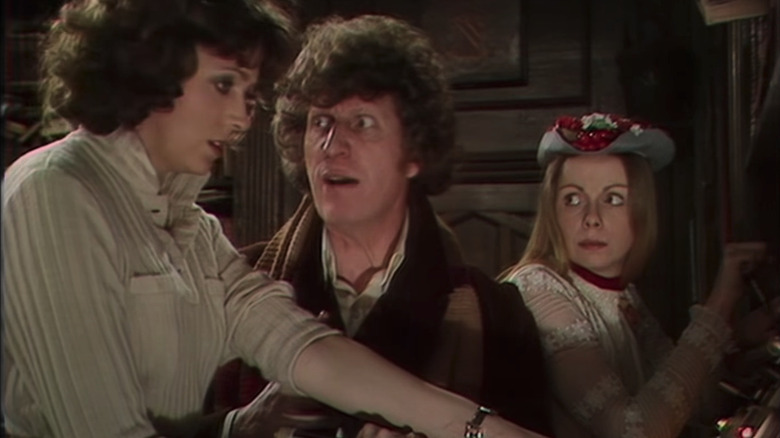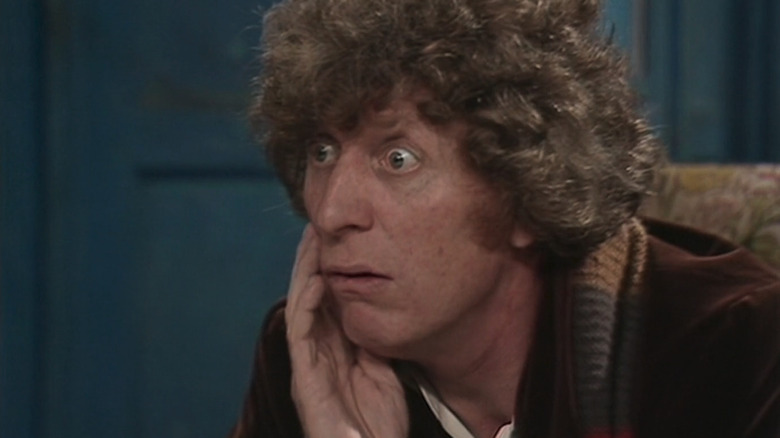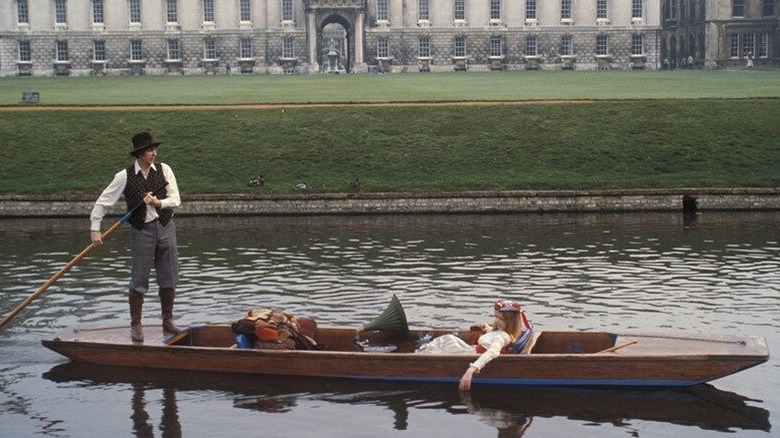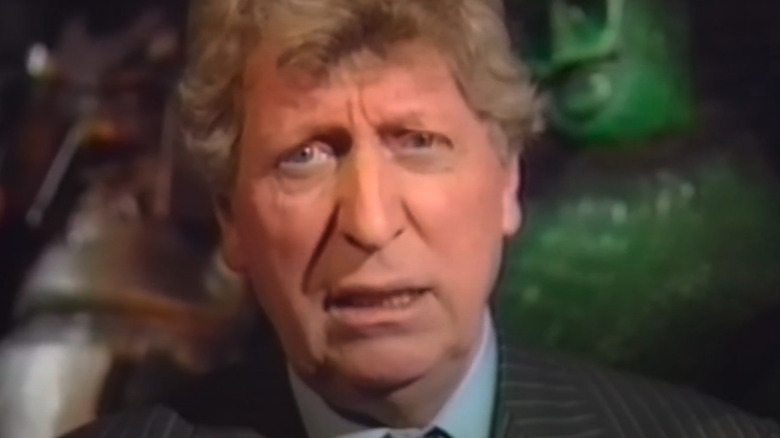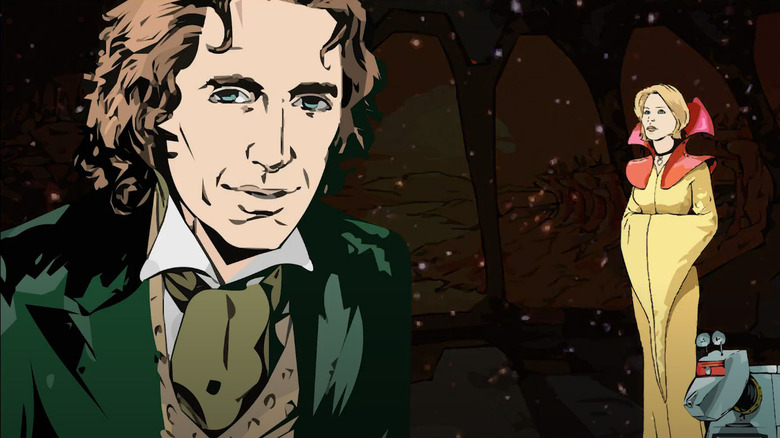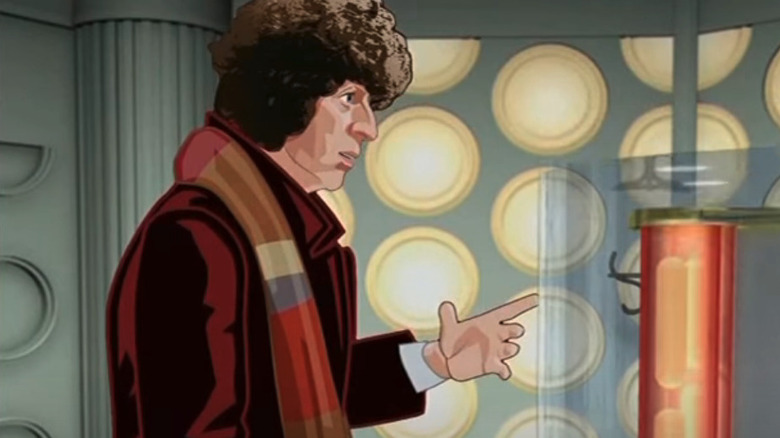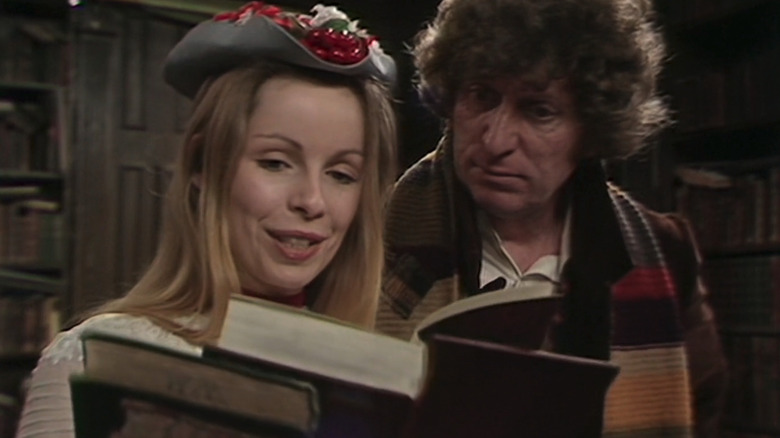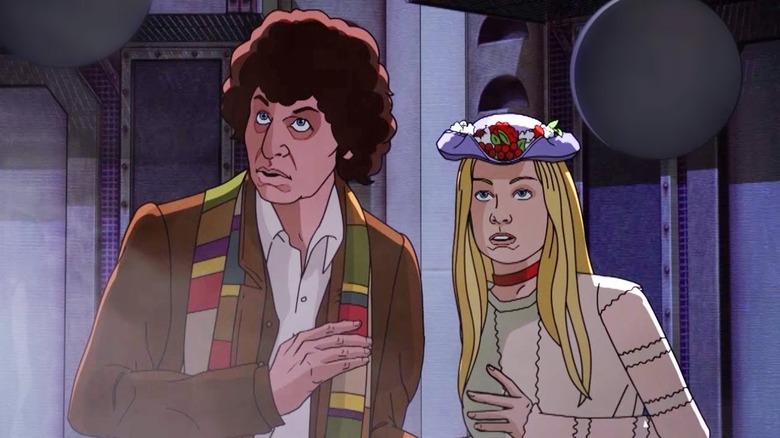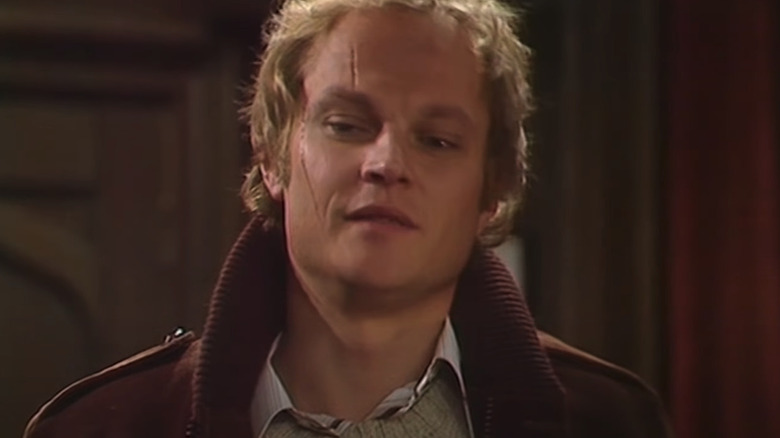Shada: The History Of Douglas Adams' Infamous Lost Doctor Who Episode
The iconic British science fiction series "Doctor Who" has been living in the hearts and minds of fans for six decades. The series has gifted pop culture with some of the most iconic heroes, villains, and indelible images, such as the Daleks, the Cybermen, and the Doctor's big blue police box — the TARDIS. The "Classic Doctor Who Era," which stretches from 1963 to 1989, includes a number of famous stories, from "The War Games" and "The Genesis of the Daleks," to "The Tomb of the Cybermen."
But few episodes are as downright legendary as "Shada," a six-part serial that nobody has ever seen in its entirety. That's because in the fall of 1979, production was shut down midway through filming due to a labor strike. "Shada" is more than just any ordinary unseen installment; it features Tom Baker — arguably the best Doctor in "Doctor Who" history — and was written by renowned sci-fi author Douglas Adams, who died in 2001. In the decades since, many efforts have been made to revive the serial, including book adaptations, animated versions, and audio dramas, to varying results.
The troubled production and labyrinthine history of "Shada" has been well-chronicled thanks to its legendary status in the "Doctor Who" saga. It was even the subject of its own half-hour documentary in 2013 titled "Taken Out of Time." But we've taken a journey through time and space ourselves, from 1979 to today, to provide a comprehensive look back at "Shada" — a lost episode of "Doctor Who."
Enter: Douglas Adams
Today, British writer Douglas Adams is best remembered as the creator and author of "The Hitchhiker's Guide to the Galaxy," a sci-fi spoof that began life as a radio drama, became a seminal series of novels, a TV series in the early '80s, and eventually a big budget feature film in 2005. But back in the early '70s, Adams was busy inundating the BBC with potential story ideas for their hit series "Doctor Who." While the studio found him a mild nuisance, he finally got a meeting with them, and then a job, after "Hitchhiker's" made him the talk of the town.
After writing the "Doctor Who" serial "The Pirate Planet" in 1978, Adams was handed the reins of the series entirely for one glorious year in 1979, becoming the show's lead script editor. Adams' stories were fresh and inventive, but often overly ambitious. In addition to "Shada," his story titled "The Krikketmen" never made it to the series but eventually formed the basis for his "Hitchhiker's" novel "Life, the Universe, and Everything."
But in spite of the problems he encountered developing his own stories, Adams' style helped breathe new life into the long-running show, with smart scripts and often more mature subject matter. His single season as editor, however, might be best remembered for its absurdist humor. The mixture of grim storylines and silly jokes didn't always mesh, but it proved memorable and remains a favorite of many a Whovian. Somewhat ironically, though, Adams' most famous contribution is arguably "Shada," one of the stories that was never completed.
Shada: a bold, experimental story
Though Douglas Adams penned "The Pirate Planet" the previous year, his duties as script editor limited him to co-writing a single multi-part story, "City of Death" in 1979, alongside David Fisher and Graham Williams. But the infamous "Shada" would have made it two, as he wrote the planned serial as a season ender that would have closed out the year in grand style with a six-part adventure.
As originally written, "Shada" begins at the University of Cambridge in then-present-day England. There, the Doctor and his companion Romana (Lalla Ward) have come in response to a mysterious message from a fellow Time Lord named Chronotis (Denis Carey). In this time period, the ageless and absent-minded Chronotis is posing as a professor at the school and doesn't seem to remember sending any message to the Doctor. Upon meeting, the Doctor learns that Chronotis just recently lent an important Gallifreyan book to a student named Chris Parsons (Daniel Hill) by mistake. According to the Doctor, it's an ancient tome that could be dangerous in the wrong hands, and it's imperative they track Parsons down.
But just as the Doctor is racing through Cambridge to find the book, Skagra (Christopher Neame) – a dangerous religious zealot with god-like aspirations — arrives seeking the book himself. We soon learn that Skagra needs the book to find the prison planet called Shada, where he is hoping to free an ancient Time Lord villain whose power he needs for his diabolical plans.
Problems during filming
The six-part story titled "Shada" began with much excitement as lead script editor Douglas Adams crafted the story himself. Adams, who was now a known name thanks to his "Hitchhiker's Guide to the Galaxy" radio comedy, had many in the production buzzing, as this was just his second script of the year. Talent in front of and behind the camera began prepping for the story, which was to be filmed on location at Adams' alma mater, the University of Cambridge.
This included filming at the university itself, with lengthy shots of the Doctor and Romana traversing the River Cam, extensive outdoor filming at the university's Emmanuel College, and a fast-paced bicycle chase sequence that ran through the city's streets. Filming continued apace, both on location and in the studio where interior sets were constructed. With an elaborate story that included more location filming than was common for the series, the production was well-planned, but problems cropped up quickly.
First, Tom Baker insisted he was capable of piloting a unique flat-bottomed boat called a "punt," but crews realized he'd need lessons once filming began. Meanwhile, with the show at the peak of its popularity and Baker enjoying his celebrity, large crowds of onlookers reportedly slowed filming. A drunken promise by producers to some local choir singers that they could appear in the episode complicated matters further. But not all of the issues the episode encountered were the fault of the cast and crew.
A strike shuts down Shada
The late 1970s was a time of turmoil for British television. While America enjoyed a whopping four channels, Britain had just three: BBC1, BBC2, and ITV. But in 1979, a strike left ITV off the air for an excruciating 11 weeks, during which the new season of "Doctor Who" began airing, leading to massive viewing figures for it and other BBC shows. But the strike that shut down ITV was just one part of a bigger problem in U.K. labor relations. Another strike rocked "Doctor Who," leading to the end of what could have been one of the biggest episodes in the series' history.
While much of the serial was completed, there was still plenty left to film when industrial action at the BBC shut down production entirely. As revealed in "Taken Out of Time," strikes were frequent that year, but they were typically limited. In this case, one particular strike affected their lighting crews, so they reworked their schedule to shoot during the day instead. While the crisis had seemingly been averted, the problems were just beginning.
On November 19th, with filming in the studio for interior sequences underway, Tom Baker and the rest of the cast suddenly found themselves locked out of the studio. News quickly broke that a broader strike had hit the BBC, and all productions ceased, including "Shada." And unfortunately, when things got back up and running, the network opted to put their focus into the other areas and leave the final "Doctor Who" story of the year unfinished.
Salvaging unused footage for a big special
Though producers had high hopes to complete the serial, the BBC wasn't budging, and the episode was officially axed. This left several days of footage featuring Tom Baker's Fourth Doctor apparently destined to never see the light of day. But a few years later, with the 20th anniversary of the program dawning in 1983, a special event episode was planned to feature all the previous Doctors uniting in one story, and it was an opportunity to salvage some of "Shada."
Then-current Fifth Doctor Peter Davison would lead the adventure, with Patrick Troughton and Jon Pertwee reprising the roles as the Second and Third Doctors, while Richard Hurndall stepped in to replace the late William Hartnell as the First Doctor. But Tom Baker refused to sign on. "I had left 'Doctor Who' because I think I'd run my course," he said later in 2014. "I didn't want to play 20 percent of the part. I didn't fancy being a feed for other Doctors — in fact, it filled me with horror."
But the episode would find a clever way of including him, using footage from the aborted "Shada." Though using existing scenes with Baker prevented him from interacting with the other Doctors, it allowed the story to live up to its title of "The Five Doctors." The footage was awkwardly inserted, and arguably doesn't work seamlessly in the broader story, but it did give fans their first glimpse at the unaired "Shada," even if most didn't realize it at the time.
Reconstruction for home video
For more than a decade after filming on "Shada" halted, the legend of the abandoned, lost episode of "Doctor Who" began to grow within the fandom. Fans were well aware of the many serials wiped by the BBC archives and the decades-long efforts to rediscover them. But this was a lost episode of a different sort entirely, and something far more mysterious because it had never been finished, few people knew much about it, and even fewer had seen what had been shot. And it was even more precious because it had been written by Douglas Adams, who had become one of the most celebrated sci-fi writers of all time by the 1990s.
Following the cancellation of "Doctor Who" in 1989, fans were — for the first time in more than 25 years — left with no new episodes at all. Perhaps in an effort to provide audiences with one more new story, producers at the BBC set out to reconstruct the lost episode "Shada," which led to a 1992 home video release, the first time it was available to the public. Though no new scenes were filmed, original star Tom Baker did return to record voiceover narration that helped connect the existing footage and smooth over the missing sequences.
Baker also appeared on camera, hosting a delightful introduction for the installment where he talks about the making and cancellation of the original story while strolling through a "Doctor Who" museum. Years later, this version of "Shada" would be included on a 2013 DVD box set.
The Eighth Doctor subs in for Shada in 2003
The 1990s are often referred to by "Doctor Who" fans as the 'Wilderness Years.' While a "Doctor Who" TV movie that introduces an Eighth Doctor played by Paul McGann came out in 1996, it never led to a series. With no show on the air, the only official stories being released were in books and comics. But beginning in 1999, Big Finish productions enlisted the services of former "Doctor Who" stars, including Colin Baker, Sylvester McCoy, and others, who lent their voices to a line of original audio dramas that continued the Doctor's adventures.
Over time, Big Finish gained a passionate fan following, and their line of stories quickly expanded. Paul McGann even returned to the role of the Eighth Doctor in his own range of adventures. In 2003, two years before the show returned to television, the BBC teamed up with Big Finish on a new version of "Shada." In place of Tom Baker, however, was Paul McGann, and the story was altered to feature his version of the Doctor. Lalla Ward returned to voice companion Romana, and the result was an online animated webcast that was later released as a standalone audio drama.
Though relatively crudely animated, the serial provided fans with the first look at what the complete "Shada" serial might have been like, from beginning to end. Little did they know this would be just the first in several animated recreations that have been put together over the years.
The fans get involved
For many fans, "Doctor Who" is more than just a TV program, but a British institution and cultural landmark that transcends mere television. For that reason, many viewers have become actively involved in the show itself. This includes the likes of Peter Capaldi and Chris Chibnall, who were both actively involved in the fan community in their teens and later became the star and showrunner of the series, respectively. But this also includes Ian Levine, a controversial figure in the fandom who was responsible for the baffling 1985 'Save Doctor Who' campaign song and music video, "Doctor in Distress," and who has spent decades obsessed with recovering lost episodes of "Doctor Who" once wiped by the BBC.
Levine's activities around the series also included an extraordinary effort to resurrect "Shada." In the early 2010s, Levine — not content with the BBC's own efforts to piece it together — took it upon himself to spearhead his own animated reconstruction. Funding the project himself, Levine attempted to reassemble the original cast for the project. But while he did manage to get original actors Lalla Ward, Christopher Neame, and Victoria Burgoyne onboard, a new actor was needed for the Doctor as Tom Baker was apparently uninterested in being involved.
With newly animated segments filling in the gaps between the completed filmed sequences, the final product was "Doctor Who and the Shada Man." While it's a clumsy homage to the original story, it proved the concept of an animated revival of "Shada" had potential.
A new novel finishes it off
By 2012, a few different versions of "Shada" had found their way into the hands of fans. Douglas Adams' original script had also accompanied the 1992 home video release, but unlike so many other "Doctor Who" stories, "Shada" had never undergone a novelization. All of that would change when it was announced in March of 2011 — almost a decade after the death of the story's original author — Douglas Adams' estate granted permission for the story to see print in book form.
Unlike previous adaptations and reconstructions, this new novelization, written by longtime "Who" author Gareth Roberts, would finally put all of Adams' ideas, as well as his sparkling dialogue, back into the full-length story as intended. But the book was more than just a slavishly faithful adaptation, as Roberts described in an interview with SFX.
"Douglas himself expressed dissatisfaction with 'Shada' and said he sighed a sigh of relief when the strike happened," Roberts told the outlet. Working off different versions of the script, Roberts cobbled together the ideal version of the story, even crafting some new material to help connect the dots. "There are several instances in 'Shada' where things are leading somewhere and they don't get there, purely, I think, because Douglas was just so pushed for time." The resulting novel was also adapted into an audiobook narrated by Lalla Ward.
Tom Baker returns for an animated revival
The "Shada" novel and audio book may have satisfied fans who sought Douglas Adams' original vision, and Ian Levine's animated reconstruction may have pleased diehards who wanted to view "Shada" on the screen. But at the end of the day, the novelization is mere words and "Doctor Who and the Shada Man" is a glorified fan film, leaving an officially sanctioned, on-screen version of the story still waiting to be created. Audiences got just that in 2017, nearly 40 years after Adams first put pen to paper on the story.
Like Ian Levine's passion project, the 2017 restoration used animation to complete the segments of the story that were left unfilmed. Backed by the BBC, this new, full-length version of the serial used high quality animation and got nearly the entire original cast, including Lalla Ward, Christopher Neame, Daniel Hill, and Victoria Burgoyne. Plus, original star Tom Baker — now well into his '80s — returned to the role that made him a British icon, to complete the story in its entirety on screen for the first time.
For the project, the production team poured over almost seven hours of film from the 1979 production, while they went back to the source negatives to re-present it all in high definition. Released as a single film, it was remastered in 2021 and split into six parts, making it as close as anyone will likely ever come to a completed version of "Shada" as it was originally intended.
Shada's place in the fandom
Throughout the 1980s and '90s, "Shada" became one of the most accidentally famous episodes of "Doctor Who," earning a near mythical status, which is impressive when you consider it was an episode that never aired. Actor Daniel Hill has described streams of fan mail over the years that questioned him about what had happened to the lost adventure.
But "Shada" is a favorite of more than just fans — Hill and the rest of the cast also seem to appreciate it. "It was one of my favorite 'Doctor Who' stories," said series star Tom Baker in 2017 after the release of the official animated reconstruction. "I have many fond memories of shooting the location scenes in Cambridge, and it was disappointing not to finish the story in studio."
Of course, the episode may be more legendary for being written by Douglas Adams and never getting finished than for being a great story. In 2013, A.V. Club called the serial a "thinly written, overly formulaic story, with some clever ideas and a smattering of good Adamsian jokes and Bakerian Doctoring stretched out over a lot of boring filler." But it remains an exciting installment beloved by fans, and if nothing else is a fascinating relic from the history of lost media.
The best thing to come from the struggle to make "Shada" a reality, however, is real-life love: It was during filming of the installment where Daniel Hill met director's assistant Olivia Bazalgette, who he eventually married.
